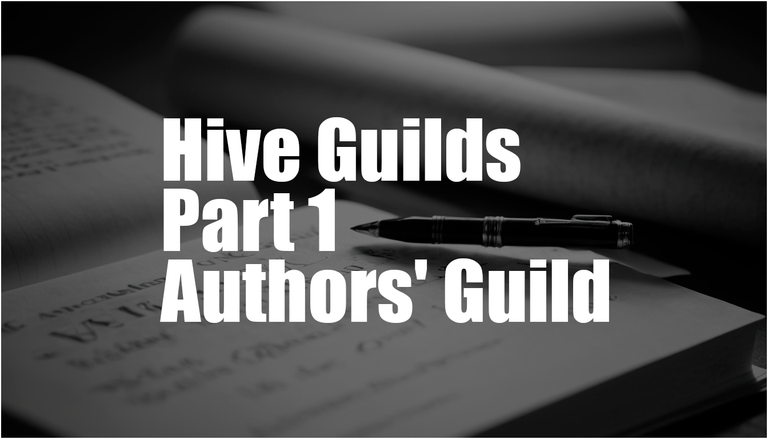
Work on this article began on December 14, 2024. Initially, the plan was to create one large article that would describe and analyze all user groups. However, during the preparation process, it became clear that it would be better to split the single article into a series of articles, with each focusing on one user group.
Everything outlined below is an attempt to systematically structure information about the functioning of this socio-system as a single organism, step by step. The article will be useful for new authors, but it will also touch on some sensitive topics relevant to more experienced participants of the discussed guild. I will not delve into the topic of behavioral ethics, as tons of material have already been written on that. This research takes a more sociological approach.
An important point — I will try to describe various subtopics not as a member of the Authors' Guild, nor as a user, but as part of the mechanism, as if I am Hive itself. I will speak about my balancing mechanisms, which are crucial for stability and growth.
The author does not call for anything, does not intend to change any written or unwritten rules, does not criticize anything, and has no intention of stirring up discord or causing unrest. The purpose of the article is to structure information from the perspective of the existing order in this particular socio-system, as well as to describe how things work in practice within a specific guild.
Like any other system, Hive has its own balance mechanisms, as well as a system of checks and balances. Some elements work systematically and effectively, while others do not and require rethinking. In this series of articles, I will attempt to explore what stabilizes the system and keeps it balanced, and what, on the contrary, creates conditions for chaos. The foundation of this socio-system is people, and they will be the subject of this study—more specifically, certain groups of people.
To simplify the information, I will use the term guild when it is necessary to highlight a specific group of users within the larger socio-system. As part of this research, I have identified 5 such user groups or guilds.
The functioning of the system as a single organism is impossible without any of these 5 guilds. To draw an analogy with a building: the Hive blockchain serves as the foundation, and the guilds are the supporting walls of the building, while all participants of the ecosystem exist under a shared roof. Just as a building cannot stand without a foundation and walls, the ecosystem cannot function without each of the guilds.
It is important to note that during their interaction with the ecosystem, over time, all guild members tend to migrate from one guild to another. Each guild, however, has its own distinct characteristics.
The Authors' Guild
Content authors are the ones who fill the ecosystem with information. This group cannot be underestimated, as they essentially create the groundwork for interaction and make the ecosystem accessible to the average user. When you write an engaging post, it holds a certain value within the ecosystem, which is reflected through likes from other users.
The Authors' Guild is the only social group that allows individuals to actively engage with the Hive ecosystem and become part of the process rather than merely observing from the sidelines. This can be done without requiring any financial investment—trading your time and creative talent as an author for potential rewards in cryptocurrency for your written content.
For those without the means to financially invest in the project, the Content Authors' Guild is an ideal starting point. If you approach your strategy wisely, assess the environment realistically (which we’ll describe in detail), and gauge your abilities accurately, this guild can serve as your springboard toward financial stability. However, inflated expectations and a poor understanding of the actual situation may, and likely will, lead to disappointment.

Without content creators, the entire mechanism would cease to function. This guild cannot be excluded as a social group, but due to various circumstances, any individual member can be replaced. The system as a whole will endure such a loss, and over time, it will be forgotten—except in very rare cases. These exceptions include authors with exceptionally high authority whose presence commands recognition.
Content is the foundation of Hive. Without it, curators have nothing to vote on, witnesses have nothing to add to blocks, and users have nothing to consume. Within this guild, the significance of individual personalities is diminished; the real value lies in the content itself, its presence—not in the authors. There are many authors, and not all articles receive due attention simply because of the sheer volume. This is why we assert that the system as a whole won’t notice the replacement of one author by another. Naturally, your acquaintances might await your next publication, but the system as a whole is indifferent; it won’t affect its internal processes.
Of course, the importance of each author in terms of content quality is undeniable (experience, knowledge, skills, etc.). However, when viewed in the broader context, almost any author can be replaced by another. This is evident from history: at one point, certain authors were active, but over time, some became inactive, and others took their place. Naturally, there are exceptions to every rule—within the Authors' Guild, there are veterans who have been creating content since the blockchain's early days, back when it was still Steem.
Members of the Authors' Guild are the most vulnerable and least protected in the ecosystem.
Without the attention of curators, content creators will not receive any financial rewards. Authors' financial benefit depends entirely on another guild. They cannot vote for themselves, as it is considered bad form. Their posts can be voted on by thousands of accounts with low weight, resulting in rewards close to zero.
Additionally, there is the risk of content theft by other dishonest participants in the ecosystem, in which case the author may receive no reward. The work of anti-spam systems or protective mechanisms is crucial in this case, hence the importance of @hivewatchers and @spaminator.
Furthermore, any author (and their motivation to write) can be destroyed by downvotes. Even if part of the users likes their content, reads it, and upvotes their posts, if another group of users decides to downvote, and this group has weight in the ecosystem (HP), then the positive votes will be nullified, along with the payout for the post. With systematic downvotes, the account will gradually lose its reputation, which can even become negative. At this point (in fact, well before the reputation reaches negative values), the account will be subjected to a so-called shadow ban, and by default, the main interfaces of the ecosystem will hide content from such accounts. Views of content by other users will be reduced to almost zero. At this stage, the earning potential of this account as an author is entirely nullified.
Examples. I do not comment on the moral or ethical side or the reasons for this event. I do not comment on whether it was right or wrong. The following two examples are given solely to illustrate the practical implementation of the downvoting mechanics and to document this event in general:
@davidpakman — The account was destroyed by systematic downvoting. Votes on many posts came from the same accounts, and it is likely that the downvoting was automated at the time of publication. All funds from the wallet were withdrawn, and the user is inactive.
@haejin — The account, as a content creator, was also destroyed. However, due to a substantial amount of HP on the account balance (around 400,000 HP), the account remains active at the time of writing this article. All activity has shifted to curation, meaning technically, within the scope of this article, the account has fully migrated from the guild of authors to the guild of curators, and in this guild, no one can prevent it from receiving financial rewards for its activity.
No other guild is subject to such actions as the guild of authors. Negative votes can only be applied to content creators. In other words, the earning model in the ecosystem based on content creation is the most vulnerable to external factors and least dependent on the technical actions of the author. At the same time, the social connections built by the author are of immense importance. If an author intentionally or unintentionally disrupts the balance of the system, it is likely to lead to certain consequences for the author themselves.
There is also the possibility of trouble in conflicts with influential groups within the ecosystem, especially in the early stages when there is still no clear understanding of how everything works and no strong social connections have been built. To maintain balance, a systematic approach is required, and interactions should be based on mutual respect. The moral component of all participants in the process is of great importance. An initially hostile or biased attitude from influential groups or individuals toward new users could potentially lead to a disruption in the balance between the influx and outflow of new users, which will negatively impact the system as a whole.
The system must be protected from hostile actions from outside, while it is important to maintain a loyal attitude toward potential new users. If this balance is disrupted, in the worst-case scenario, it can lead to a decline in user activity and, over time, to the collapse of the ecosystem.
Rewards for Content Creators

Ensuring fair compensation for every author is an unsolvable task, as content quality is a subjective metric. A reward may be fair from the curators' perspective, but unfair from the author's point of view—there is no absolute truth in this matter, as the issue lies in the very terminology. However, the existence of different curator groups, their efforts to find high-quality content, and their curating activities yield certain results, contributing to the ecosystem's growth. If there were no balance, the system would have already collapsed.
In the process of preparing this material, I asked users of the ecosystem for their personal opinion. The question was: "I’m exclusively interested in your personal opinion—how much in $ should a quality article on Hive earn, on average (+/-)?" The responses varied, and I managed to gather a few numerical answers from users on Snaps on Peakd.com:
- @coyotelation — 10 HBD.
- @anonymous02 — from 10 to 100 HBD.
- @curamax — bear market 50-100 USD, bull market 300-500 USD.
- @leaky20 — up to 100-150 USD.
The answers are also subjective and depend on a huge number of factors, from worldview to the cycles of the cryptocurrency market. However, this question cannot be considered representative, meaning it does not reflect the opinion of the entire ecosystem; rather, it is more about personal reflections. Unfortunately, at this stage, I do not have the resources to conduct large sociological surveys within the target group, so the information regarding opinions on the payment price range remains unknown.
Negative votes as a mechanism for balancing author payouts
The mechanics of negative votes are such that their presence overrides positive votes and cuts down the rewards for a post, proportional to the strength of the vote. Additionally, the author's reputation is reduced if it is initially lower than the reputation of the voter.
This is a very delicate topic, and in my brief experience here, I have encountered a variety of opinions on the matter, ranging from "this is dictatorship and arbitrariness" to conspiracy theories about the Freemasons. In reality, the Freemasons don't care about the 2-3-10 USD taken from an author; I tend to believe that this is rather an attempt to balance author payouts. Below, I will provide justification for this assertion. For example, let's visualize two scenarios from imagination:
An author who has been writing since the beginning of the blockchain's creation, with a few thousand followers always ready to support their post with likes. For example, they publish an article with 5 screenshots from their work PC and a few short blocks of text: an introduction, a brief description of the screenshots, and a short conclusion. This took a maximum of 20-30 minutes. However, due to their authority and number of followers, the reward for the post reaches, say, 150 USD within the first hour.
A new author, with just a few followers, has published a few texts with tiny rewards. Then, they decide to write a detailed expert article of 5,000 words on a subject they know well (they have something to share), complete with numerous photos, diagrams, screenshots, infographics, quotes, sources, music, dance videos, and so on. They spend several days gathering materials and writing. They publish it, and after a few days, they get 50 likes and a total of 3 USD.
Are these two cases fair? Both yes and no at the same time.
Yes, because the first author has spent hundreds or even thousands of hours building social connections, contributing to the ecosystem, and investing both time and finances. The second author is just taking their first steps.
No, because the resources invested in the two articles are incomparable. As I mentioned earlier, in the context of the project, the term "quality content" presents an unsolvable problem.
Looking ahead, after analyzing the payments to authors for one month, I mathematically derived the following figures: 1.25% of TOP authors take 47% of the total reward pool for all authors. These numbers will be explained in detail below. Frankly, these are somewhat alarming figures, which not only should be, but must be balanced in order for the system to function smoothly and sustainably.
Theoretically, negative votes are the only mechanism that can restore balance if any author starts receiving rewards that deviate significantly from the average payout.
On the other hand, if negative votes are used irresponsibly, they can lead to destabilization and the collapse of the entire system as a cohesive organism. In the case of indiscriminate or unjustified mass negative voting, it can push active users out of the ecosystem, leading them to withdraw and sell their HIVE on exchanges, which would deter potential users.
A superficial analysis of the use of negative votes for balancing author payouts did not reveal a systematic approach. Probably one of the most well-known accounts issuing fairly substantial negative votes to authors with relatively high payouts is @smooth. Here are examples of recent negative votes (as of the time of writing):
| Article | minus in USD | Total reward |
|---|---|---|
| link | -1.74 | 25.02 |
| link | -1.75 | 46.52 |
| link | -1.77 | 26.61 |
| link | -4.4 | 26.34 |
| link | -4.42 | 87.9 |
| link | -4.44 | 104.72 |
| link | -4.45 | 110.45 |
| link | -3.59 | 28.7 |
| link | -4.62 | 57.96 |
| link | -3.72 | 47.99 |
The numbers in the table and on the publications may differ because the voting has not yet been concluded, and the HIVE exchange rate is also subject to fluctuations.
The table shows that negative votes are cast at different reward levels, and the weight of the vote changes slightly depending on the amount of the reward. A quick analysis of negative votes from the past few weeks hasn't revealed a clear pattern (though this doesn't mean there isn't one). Some days there were 5-10 negative votes, sometimes only 2-3, and sometimes days without any negative votes. Of course, a negative vote can come from any user, and there's no obligation to justify it—it's just a function of the blockchain protocol, a tool. This can be especially painful if it's coming from someone with millions of HP in their account, and if they do this systematically, the author's career could be over...
For positive votes, I know about a dozen major curatorial projects, and practically every community has its own curator. In fact, any account with a sufficient amount of HP, starting from around 20k, can increase the reward. So there are at least several hundred people who positively balance rewards. But the account that systematically casts negative votes in a noticeable way, as far as I know, is only one. It's possible that there are more.
In summary, a single account cannot physically balance author rewards with negative votes. It can make attempts, but there won't be any consistency, only spikes of activity, which creates uncertainty.
In the case of negative votes, the lack of a systematic approach or the spontaneity in decisions can further destabilize the reward gap between top authors, average-ranking authors, and those with the lowest rewards.
Top authors by payouts and a bit of math
Now, I would like to provide information about the top earners for the month the statistics for November 2024: This information was provided by @dalz, for which I thank him.
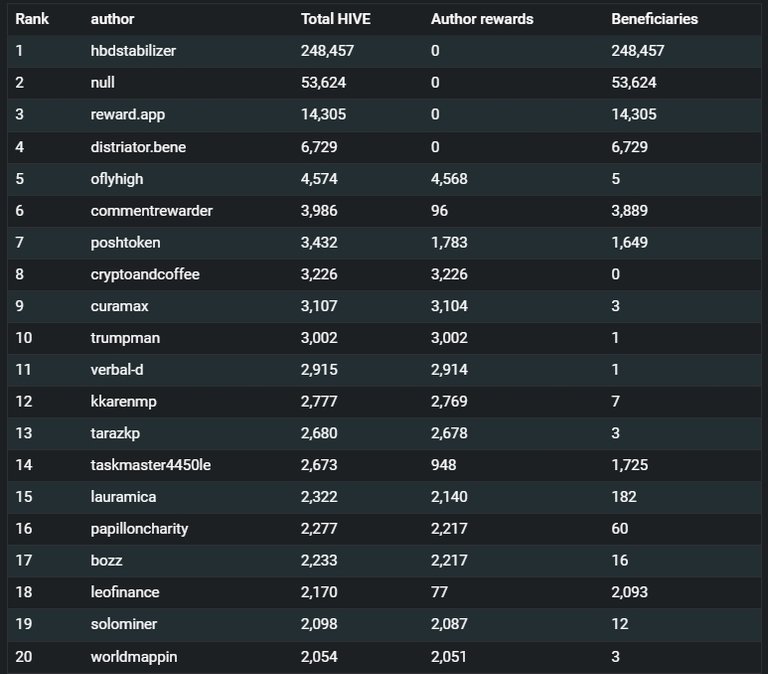
TOP 1-20. The first 3 positions on the list are technical. In the middle of the rewards list, the average is 2,600 HIVE or about 830 USD at the current exchange rate.
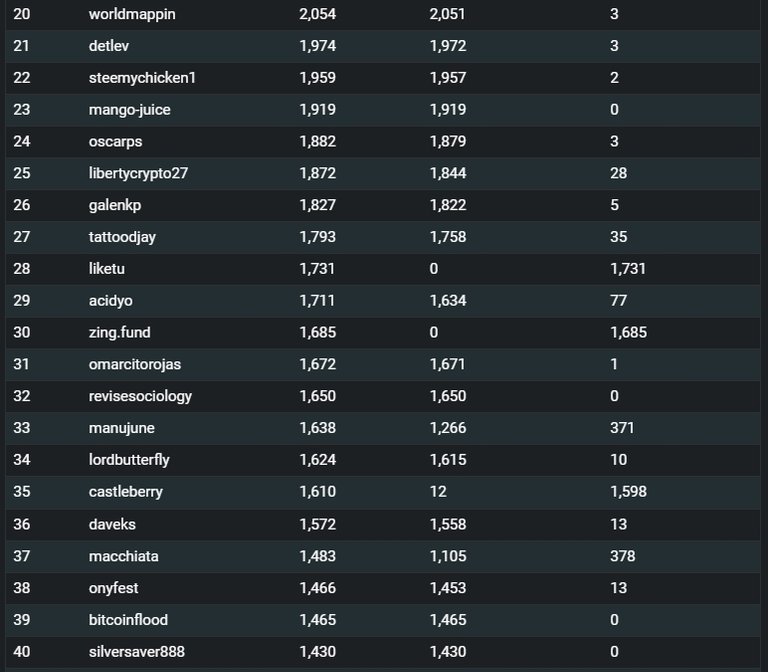
TOP 20-40. In 30th place (average) is 1,685 HIVE or about 540 USD at the current exchange rate.
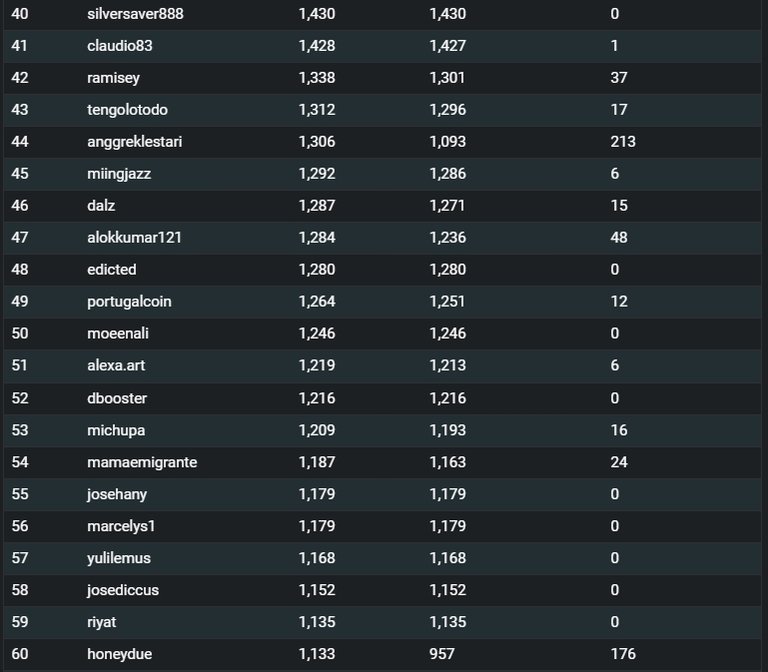
TOP 40-60. In 50th place (average) is 1,246 HIVE or about 400 USD at the current exchange rate.
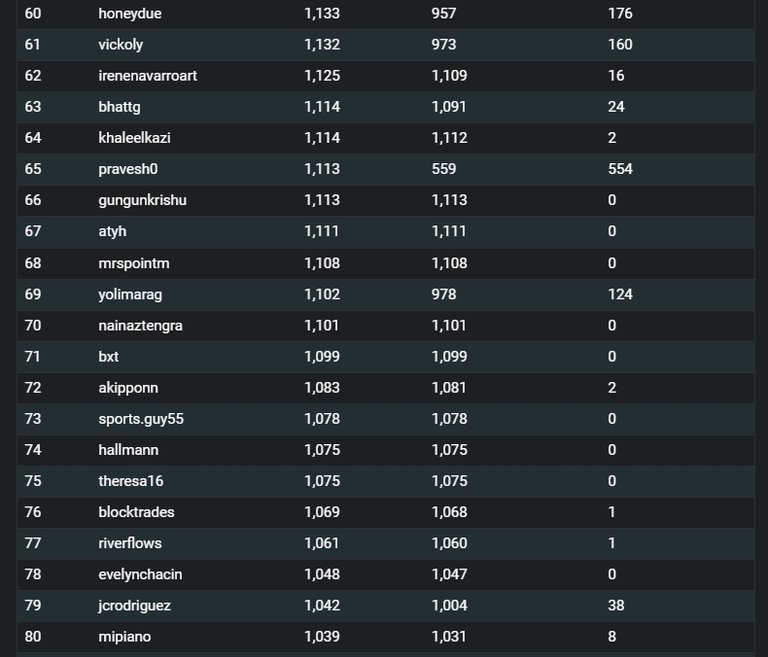
TOP 60-80. In 70th place (average) is 1,101 HIVE or about 350 USD at the current exchange rate.
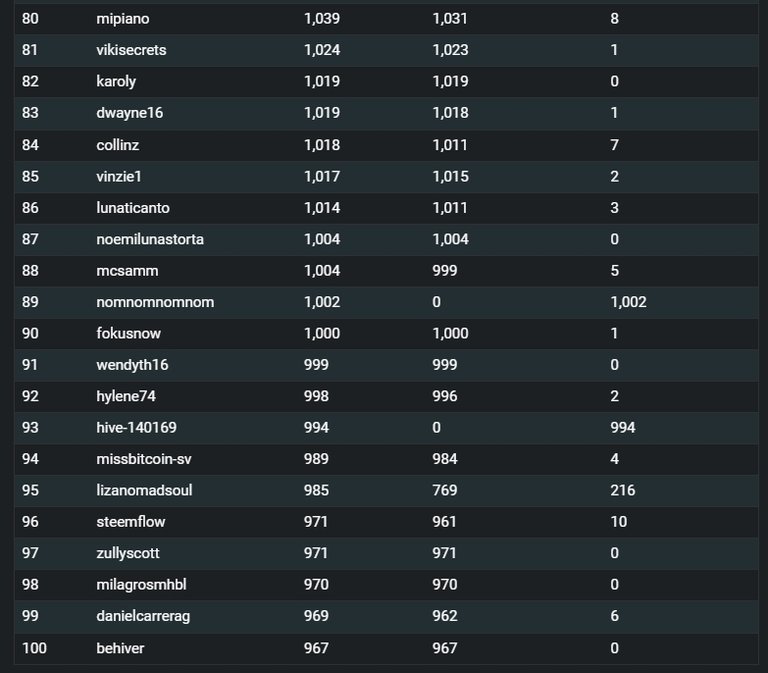
TOP 80-100. In 90th place (average) is 1,000 HIVE or about 320 USD at the current exchange rate.
Let's add this averaged data to a new table:
| Position | HIVE | USD |
|---|---|---|
| ТОP 1-20 | 2,600 | 830 |
| ТОP 20-40 | 1,685 | 540 |
| ТОP 40-60 | 1,246 | 400 |
| ТОP 60-80 | 1,101 | 350 |
| ТОP 80-100 | 1000 | 320 |
This is an article about overall inflation for November 2024 by @dalz. Right now, we are interested in specific quotes that relate to authors.
In terms of absolute numbers, the HIVE supply in November 2024 has increased from 455.8M to 460.2M, adding 4.4M HIVE in circulation, while the projected one is around 2M.
The total inflation for November 2024 was 4.4M HIVE, the figure has been recorded, moving on.
Note that authors rewards are paid 50% HIVE, 50% HBD, and the HIVE share only is at 500k, while approximately the same amount was paid in HBD equivalent.
So, the authors' guild received around 1 million HIVE in rewards for November.
Quote from the article https://peakd.com/hive-133987/@dalz/top-hive-earners-by-category-or-authors-curators-witnesses-dao-hbd-interest-or-november-2024, which relates to content creators:
There are around 8k accounts that have received rewards in November 2024. The median payout is 6 HIVE, while the average is around 100 HIVE.
Now let's return to the table https://peakd.com/hive-133987/@dalz/top-hive-earners-by-category-or-authors-curators-witnesses-dao-hbd-interest-or-november-2024 for the payouts of the top 100 authors, I used a calculator to calculate how much HIVE the top 100 authors received. I got 469,154 HIVE.
So, 100 authors out of 8,000, which is 1.25%, earned about 47% of the total reward pool for authors. Impressive, right? Of course, the first 3 positions on the list are technical accounts, but technically, they are also content authors, for whose posts votes are cast and rewards are paid.
Based on the averaged data from the table above and quotes from the reports, the following conclusions can be made:
The difference between the TOP 20 and TOP 40 is about 50% (this is excluding the first 3 technical accounts from the list), while the difference between TOP 60-80 and TOP 80-100 is only 10%. This shows a trend — as the ranking lowers, the average reward values tend to equalize, and the difference decreases. Additionally, the lower the ranking, the more authors earned roughly the same amount of rewards. I would venture to assume that the overall picture for other months will be similar, with small deviations.
Authors who are below this top group will have rewards of less than 1,000 HIVE, which, at the current rate, is about 320 USD. But even this, based on the numbers provided above, is considered a very high figure.
It is not possible to analyze all the statistics of author payouts to understand the full picture. As we calculated earlier, 1.25% of the TOP authors take 47% of the total pool, while the remaining 53% is divided among the other 98.75% of authors. These numbers look alarming, and there may be some imbalance in this case.
Despite the fact that the author's guild is the most vulnerable in the ecosystem, it is also the simplest entry point that does not require financial investment. The risks associated with financial losses are completely absent. The burden of responsibility for the functioning of the entire system is minimal. All duties, if they can be called that, come down to writing texts and showing respect toward other users.
The author's guild is a social group with its own set of advantages and disadvantages, with its own balancing mechanisms. Like in any other social group, your career will depend on your decisions and actions. At the same time, it is necessary to understand a few fundamental things for this guild. A normal evolutionary process within the Hive ecosystem is the organic migration of authors to the next guild in our list — the curators' guild.
Conclusions
- If you are a newcomer, do not treat the authors' guild as your main source of income. It’s a great option for a hobby, but it’s unlikely that writing texts on Hive alone will be a primary source of income for a family or even for an adult person. I'm sure there are authors who make it work, but that's more of an exception.
- Author payouts are largely dependent on the quality of their social connections on the platform. More connections = higher payouts. Build social connections, occasionally take a break from writing, and try to make new acquaintances — often it’s just enjoyable.
- From a technical perspective, in terms of rewards, the authors' guild is entirely dependent on the curators' guild.
- A small portion of authors receives the majority of the reward pool for authors, while the majority of authors get a relatively small portion of the total pool. At the beginning of your journey, you are in for a long road. It’s better if you understand the real state of affairs from the start, without any rosy illusions.
- Intentional or accidental disruption of the existing balance can lead to negative consequences.
- If we draw an analogy with offline society, using a specific country as an example, the authors' guild is more like the civilian population, the poor and middle social class, with all its characteristics.
- Authors are the most vulnerable guild, yet they take fewer risks than others, and it is the simplest way to enter the ecosystem.
Sources:
To be continued...
Congratulations @detectblock! You have completed the following achievement on the Hive blockchain And have been rewarded with New badge(s)
Your next target is to reach 800 upvotes.
You can view your badges on your board and compare yourself to others in the Ranking
If you no longer want to receive notifications, reply to this comment with the word
STOPCheck out our last posts:
🫶🫶🫶
Hola @detectblock estoy interesada en seguir ampliando la lupa desde un enfoque sociologico a esta comunidad llamada @hive.blog. Creo desde un enfoque de la era digital y la transformación social que, implicita y explicitamente conllevan, ofrecen un panorama interesante para la investigación.
Seguiré leyendo tus publicaciones, me has abierto una linea que no habia visto en el ejercicio reflexivo. Gracias.
Saludos, bendiciones y éxitos.